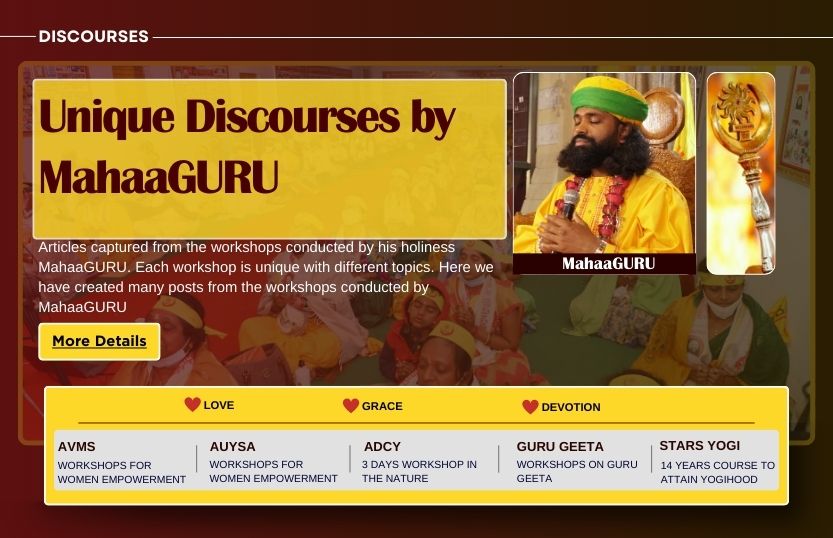The Root Cause of Suffering: Attachment to ‘I’ and ‘Mine’
The feelings and desires of ‘mine’ and ‘I’ are the reasons for suffering. Every human being born on Earth goes to great lengths to acquire money and things for themselves. If we conquer our desires, we will get closer to the Supreme Soul. This is the essence of Buddhism and Vedanta.
The Futility of Material Possessions and Desire
Nothing in the world that I think is mine truly belongs to me. Everything is divine. I am the master of the house, the supreme master of the universe. The home is in the universe. One who is not separate from the universe realizes that the house also belongs to God. I am merely a tenant. That’s it; the tenant uses the house and its facilities. There is nothing wrong in doing so. It is painful to think ‘this is mine.’ From that moment, sorrow begins.
Realizing Our Place in the Universe: We Are Merely Tenants
God has given us everything, just as a landlord rents out a house. He gave me eyes, ears, and legs. He gave me a wife. He blessed the children and provided them with food. He gave us drink and possessions. He gave us life.
God’s Gifts Are Temporary: Understanding Divine Ownership
All these things are ours, but they are not ours. If we sit on a chair while waiting for a cart and then get up when the cart arrives, we leave the chair behind. Why? It is not ours. The chair belongs to the government. Usability is ours.
Life’s Temporary Nature: The Example of a Chair
If a person is reading a magazine and we ask to borrow it, we use it and then return it when we reach our destination. The magazine belongs to the person, but its usability was ours.
The Principle of Usability: Everything Is for Use, Not Ownership
Everything in this world is for use. Understand this truth and it will be a living offering. Whatever is received after this understanding is considered prasadam.
Understanding the Temporary Nature of Worldly Possessions
While sitting on the chair and waiting for the cart, if we say, “Hey! Watch my chair,” we imply that we will return to use it again. Even if we refer to it as “my chair,” we know it truly belongs to the government. “My chair” is not a true possession. Similarly, when we leave everything at the moment of death, we should do so with the same ease as leaving a rented house or a chair at the platform.
Embracing Detachment: Returning What Belongs to God
Since everything we have in this world belongs to God, we should always be ready to return it comfortably without attachment. A person who lives this way is a devotee and beloved of God.
The Persistence of Attachment: The Challenge of Letting Go of ‘Mine’
Although these truths are clear, the sense of ‘mine’ persists. The attachment to ‘mine’ is not easily removed. As long as there is pride, pride remains.
The Practice of Sacrifice: A Path to Liberation
Therefore, while living in this world, one must practice sacrifice. Donations should be made. Not everyone realizes that service is the essence of such acts.
The Importance of Preparation: Why Transformation Begins Within
Many dishes are prepared, but hunger remains unquenched. The fault lies not with the cooking but with the one who serves. Cooking is futile if one is not prepared to eat. If the mind is not prepared, teachings will not be understood. Even if they are understood, they will not yield results. Everyone wants change, but few are ready to change. Those who want to change often do not achieve it because changing is painful.
Shining in Your Own Glory: The Natural Path to Transformation
No one needs to change anyone else. When someone shines in their own glory, change will happen naturally. If others aren’t ready to change, they will find their own place of rest. Once this understanding is reached, a profound transformation has already occurred.
Here are 10 keypoints are :
-
01: Attachment to 'Mine' Causes Suffering: The feelings of ownership and attachment are the root causes of human suffering.
-
02: Desire and Possession: The relentless pursuit of material wealth and possessions distances us from spiritual realization.
-
03: Divine Ownership: Everything in the world, including our bodies and possessions, belongs to the divine; we are merely temporary users.
-
04: Life as a Temporary Tenancy: Our existence and all that we claim as 'ours' are like a rented house; they are to be used but not owned.
-
05: Detachment Leads to Peace: Understanding that nothing truly belongs to us helps in overcoming sorrow and achieving inner peace.
-
06: Living with Gratitude: Life should be lived with the awareness that everything we have is a divine gift, leading to a sense of gratitude.
-
07: Sacrifice and Service: Practicing detachment through sacrifice, service, and donations is essential for spiritual growth.
-
08: Understanding Use vs. Ownership: Just as we use a chair or a magazine temporarily, we should view our possessions as temporary and not truly ours.
-
09: Change Through Inner Realization: True change and spiritual awakening come from within; one must be prepared to change themselves, not others.
-
10: Embrace Spiritual Teachings: Spiritual teachings are only effective if the mind is ready to accept and apply them; otherwise, they remain unfulfilled.
External references
To find more divine content, you can visit shreeprabhu website.
